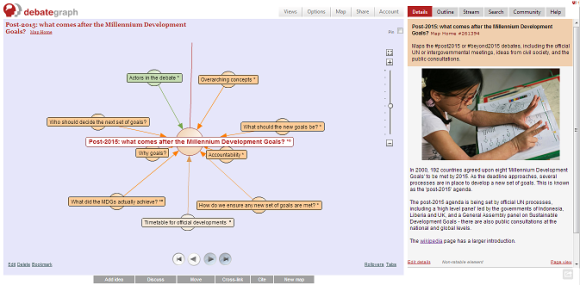
The Millennium Development Goals were supposed to be met by 2015. There have been some successes, some failures. Whether the goals actually caused the improvement in some of the indicators is unknowable, but Claire Melamed and Andy Sumner argue that they certainly changed the debate, and that they changed aid spending and political priorities.
And the thousands of people assembling at Rio+20 this summer will be discussing the idea of sustainable development goals, with the idea of merging social, economic and environmental goals. At Rio they’ll have to agree on some basic priorities. But post-Rio, agreeing on indicators to measure performance on these goals is not going to be easy.
But in all the talk about what should follow in the second round of MDGs or SDGs, nobody’s grasped that the world has changed since the late 1990s when the first goals were drafted.
First – are goals the most appropriate tool for what we’re trying to achieve? See Melamed and Sumner again for a thoughtful range of questions on this subject.
Second – assuming they are – this time they’re likely to be global goals. They will be universal – applicable not just to poor nations. This time, environmental and social goals must be tackled alongside eradicating poverty. Or goals should be found that satisfy all three elements of sustainable development.
So we all have a stake in the goals, and we all have a responsibility to help meet them. Does it not follow that we all should have a say in them?
Ergo – let’s crowdsource the next round of development goals.
Charles Kenny, top aid-protagonist at CGD, actually referred to the next round of goals as MDGs 2.0, without going into the 2.0 aspect. Ben Leo, of the ONE campaign, used the same phrase to argue that the poor must decide on the next round of MDGs.
The debate is underway across twitter and the aid blogosphere. But it has to go beyond the experts, practitioners or academics. Everyone should be invited to think about the “future we want” and have the opportunity to contribute.
So, UN, this is your task. Your website frontpage says ‘it’s your UN’. The first line of the Charter says ‘we the peoples’. Let’s live this – get the world together online to start talking about what the next round of goals should be. Build a platform that allows for drafting, commenting, voting.
This is an amazing opportunity for public participation and engagement with the goals. The greater the participation, the greater the buy-in from the global public, the greater the chance we’ll meet the goals next time.
The UN could combine digital crowdsourcing with offline participation opportunities to host the world’s greatest participative agenda-setting event. This would help the UN position itself as the go-to platform for global participative governance.
We’ve got 3 years to go.
(Start by following #SDGs and #MDGs on twitter)
Flickr credit: MT_bulli


